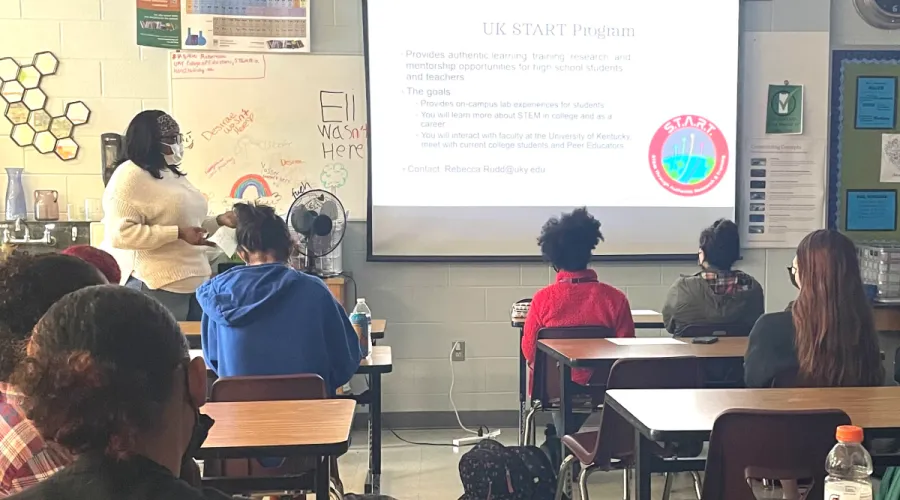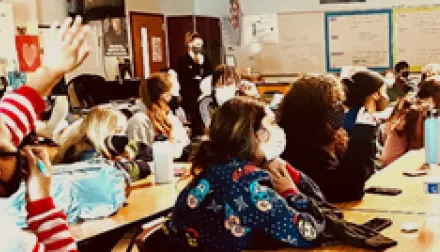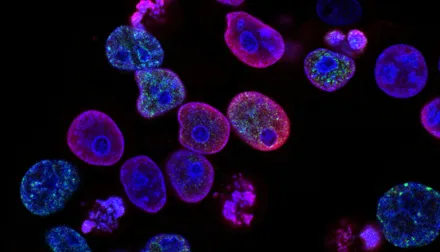
START Outreach
A variety of STEM content in classrooms and beyond.
More START Presentation Subjects
START has reached over 1,100 students via in-person and virtual classroom STEM talks and tours. UK faculty and students lead interactive presentations on a variety of customizable subjects. Our menu is always expanding.
CLASSROOM VISITS
CLASSROOM VISITS, virtual or in-person, are an excellent way to pique student interest in many STEM areas and career pathways.
CLASSROOM VISITS
CLASSROOM VISITS, virtual or in-person, are an excellent way to pique student interest in many STEM areas and career pathways.
LAB TOURS
LAB TOURS give a real-world view of STEM in action at UK or at START partner labs.
LAB TOURS
LAB TOURS give a real-world view of STEM in action at UK or at START partner labs.
ASK A SCIENTIST Q & A
ASK A SCIENTIST Q & A sessions are available with an expert in STEM topics chosen by the class.
ASK A SCIENTIST Q & A
ASK A SCIENTIST Q & A sessions are available with an expert in STEM topics chosen by the class.
HUMANITY IN DEEP SPACE WEBINARS
HUMANITY IN DEEP SPACE WEBINARS are co-sponsored by START and bring to life intriguing issues around STEM in Space. Visit Humanity in Deep Space - YouTube to subscribe.
HUMANITY IN DEEP SPACE WEBINARS
HUMANITY IN DEEP SPACE WEBINARS are co-sponsored by START and bring to life intriguing issues around STEM in Space. Visit Humanity in Deep Space - YouTube to subscribe.
KY-WV LSAMP
KY-WV LSAMP (LOUIS STOKES ALLIANCE FOR MINORITY PARTICPATION): LSAMP is a nationwide alliance for minority STEM college students on hundreds of college campuses. The UK Chapter of LSAMP is a connection hub for current and future students. A member of LSAMP will speak with your class or connect with your students one-on-one.v
KY-WV LSAMP
KY-WV LSAMP (LOUIS STOKES ALLIANCE FOR MINORITY PARTICPATION): LSAMP is a nationwide alliance for minority STEM college students on hundreds of college campuses. The UK Chapter of LSAMP is a connection hub for current and future students. A member of LSAMP will speak with your class or connect with your students one-on-one.v
DISSECTION FAQS
DISSECTION FAQS: The Neuroscience team brings specimens and talks about dissection, brain/torso/spinal cord preservation through chemicals, biology, the cortex, spatial differences, neurons as a unit of the central nervous system, and more.
DISSECTION FAQS
DISSECTION FAQS: The Neuroscience team brings specimens and talks about dissection, brain/torso/spinal cord preservation through chemicals, biology, the cortex, spatial differences, neurons as a unit of the central nervous system, and more.
IMMUNOLOGY
IMMUNOLOGY: This timely talk by members of the Microbiology, Immunology, and Molecular Genetics (MIMG) Department focuses around COVID issues, vaccination science and public health.
IMMUNOLOGY
IMMUNOLOGY: This timely talk by members of the Microbiology, Immunology, and Molecular Genetics (MIMG) Department focuses around COVID issues, vaccination science and public health.
MATERIALS AND AEROSPACE ENGINEERING
MATERIALS AND AEROSPACE ENGINEERING: Faculty and students in this NASA affiliated UK department bring prototypes and videos from space of research missions regarding orbital re-entry materials research.
MATERIALS AND AEROSPACE ENGINEERING
MATERIALS AND AEROSPACE ENGINEERING: Faculty and students in this NASA affiliated UK department bring prototypes and videos from space of research missions regarding orbital re-entry materials research.
CHEMICAL ENGINEERING
CHEMICAL ENGINEERING: Student leader presentation - who are chemical engineers, what do they do, what products do they improve, where do they work, job placement statistics, educational paths, and career options.
CHEMICAL ENGINEERING
CHEMICAL ENGINEERING: Student leader presentation - who are chemical engineers, what do they do, what products do they improve, where do they work, job placement statistics, educational paths, and career options.
THE BRAIN, HOMEOSTASIS AND TRAUMATIC BRAIN INJURIES
THE BRAIN, HOMEOSTASIS AND TRAUMATIC BRAIN INJURIES: Students view specimens of brains and spinal cords while learning about concussions, traumatic brain injuries, making a diagnosis, the neural response, costs of medical needs, personality changes and more.
THE BRAIN, HOMEOSTASIS AND TRAUMATIC BRAIN INJURIES
THE BRAIN, HOMEOSTASIS AND TRAUMATIC BRAIN INJURIES: Students view specimens of brains and spinal cords while learning about concussions, traumatic brain injuries, making a diagnosis, the neural response, costs of medical needs, personality changes and more.
SYMPHONY OF THE CELL DATA SONIFICATOIN DEMO
SYMPHONY OF THE CELL DATA SONIFICATOIN DEMO: This collaboration between The Bradley Lab & UK School of Music teaches students about the central dogma of molecular biology and the molecular basis of disease, using an interactive demonstration converting protein amino acid sequences into sound - with students choosing the proteins of interest. Format: In-person only.
SYMPHONY OF THE CELL DATA SONIFICATOIN DEMO
SYMPHONY OF THE CELL DATA SONIFICATOIN DEMO: This collaboration between The Bradley Lab & UK School of Music teaches students about the central dogma of molecular biology and the molecular basis of disease, using an interactive demonstration converting protein amino acid sequences into sound - with students choosing the proteins of interest. Format: In-person only.
PLANT PATHOLOGY, MICROBIOLOGY AND MEDICAL BIOTECH
PLANT PATHOLOGY, MICROBIOLOGY AND MEDICAL BIOTECH: Two highly interactive talks:
- Fungus among us - beautiful, edible, and sometimes deadly! Fungi are a familiar (but in many ways still mysterious) group of organisms that play critical roles in our health, food security, and environmental sustainability. Students see, feel, smell, and maybe taste different fungi that impact their lives and learn how the world depends on these small organisms to function.
- From the field to the fridge - plants get sick too! Just like humans, plants can get sick from viruses, bacteria, fungi, and even microscopic worms. Plant diseases cost the American economy more than $300 billion a year in potential revenue, and threaten our food security. In the next decade we may lose access to affordable bread, bananas, coffee, and many of our other favorite foods because of plant diseases. This session will allow students to observe different diseases in common food items and identify the pathogens that make plants sick.
PLANT PATHOLOGY, MICROBIOLOGY AND MEDICAL BIOTECH
PLANT PATHOLOGY, MICROBIOLOGY AND MEDICAL BIOTECH: Two highly interactive talks:
- Fungus among us - beautiful, edible, and sometimes deadly! Fungi are a familiar (but in many ways still mysterious) group of organisms that play critical roles in our health, food security, and environmental sustainability. Students see, feel, smell, and maybe taste different fungi that impact their lives and learn how the world depends on these small organisms to function.
- From the field to the fridge - plants get sick too! Just like humans, plants can get sick from viruses, bacteria, fungi, and even microscopic worms. Plant diseases cost the American economy more than $300 billion a year in potential revenue, and threaten our food security. In the next decade we may lose access to affordable bread, bananas, coffee, and many of our other favorite foods because of plant diseases. This session will allow students to observe different diseases in common food items and identify the pathogens that make plants sick.


